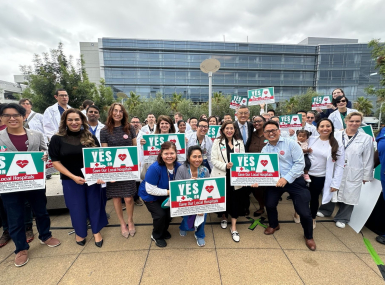Michelle Alyssa Go Act reintroduced in the 119th Congress, a critical step for county behavioral health systems
Author

Blaire Bryant

Naomi Freel
Upcoming Events
Related News

Key Takeaways
OCTOBER 17, 2025 UPDATE: On October 17, NACo sent a letter to Congress in support of the Michelle Alyssa Go Act (H.R. 5462). Read NACo's letter of support here.
On September 18, the Michelle Alyssa Go Act (H.R. 5462) was reintroduced in the U.S. House of Representatives. This bipartisan legislation aims to increase the number of federal Medicaid-eligible in-patient psychiatric beds from 16 to 36, providing critical support for individuals seeking treatment for mental health and substance use disorders.
Michelle Alyssa Go Act
The Michelle Alyssa Go Act would provide needed reforms to federal Medicaid policy that prohibits reimbursement for care provided in psychiatric or residential treatment facilities with more than 16 beds, defined as Institutions for Mental Diseases (IMDs). Through these reforms the bill:
- Addresses a significant gap in mental health and substance use disorder treatment access by offering critical support for those who require intensive treatment for mental health and substance use disorders.
- Ensures that facilities not only increase their capacity but also maintain high-quality care standards by mandating that mental health facilities receiving federal Medicaid funding meet nationally recognized, evidence-based standards for their programs.
Importance to counties
Counties play a pivotal role in the nation's behavioral health system, acting as the safety net for residents in need. They serve as first responders and operate crisis lines, public hospitals and detention centers. About two-thirds of the U.S. population relies on county-based behavioral health services through more than 750 county-supported or operated behavioral health authorities. In nearly every state and the District of Columbia, at least one mental health facility is operated by a county, local or municipal government. Furthermore, counties help finance and administer Medicaid services, the largest funding source for behavioral health services in the United States.
Without reforms to the Medicaid IMD exclusion policy, patients will continue to be diverted from capable mental healthcare institutions, leading to an overreliance on emergency departments or leaving residents with no care at all. This diversion not only places financial burdens on counties but also creates administrative complexities.
Enactment of the Michelle Alyssa Go Act would expand the treatment capacity of county-operated hospitals and behavioral health facilities. It would promote equitable access to treatment options for low-income individuals by increasing the number of Medicaid-eligible beds. This legislative change would remove significant obstacles to providing a full continuum of care, improving the overall health and well-being of communities.
Write to your members of Congress in support of the Michelle Alyssa Go Act today!
Resource
Overcoming Barriers for Equitable Care Access: How the IMD Exclusion Impacts Counties

Related News

CMS issues new guidance on Medicaid Community Engagement Requirements
On December 8, the Centers for Medicare & Medicaid Services (CMS) released a Medicaid and CHIP Services Informational Bulletin (CIB) directing states on how to implement the Medicaid community engagement requirements enacted under Section 71119 of the One Big Beautiful Bill Act legislation (Public Law 119-21), or H.R. 1.

California county sales tax measure backfills federal healthcare cuts
Santa Clara County, Calif. will raise an estimated $330 million each year from a sales tax to backfill lose Medicaid funding.
